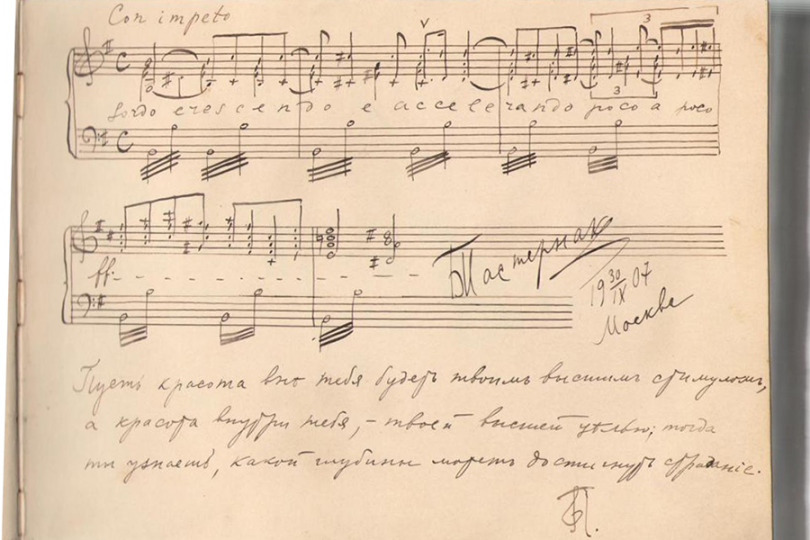HSE Researcher Unveils Boris Pasternak's Never-before-seen Signature

During a recent conference at Stanford University, Leonid Bolshukhin, lecturer in HSE Nizhny Novgorod's Faculty of Humanities, presented a discovery dating back to Boris Pasternak’s school years. This concerns a page from a classmate’s journal on which Pasternak wrote a musical phrase, along with a note and signature.
The conference at Stanford was devoted to Pasternak’s work, the focus being on ‘The Fate of Doctor Zhivago,’ and was organised by the world’s foremost expert on Pasternak, Lazar Fleishman. It is quite an honour to speak at the conference, as Fleishman is very particular when selecting topics and presenters. But it was thanks to his discovery that Bolshukhin was invited to speak at Stanford, and he found himself among some of the leading Russian and international Slavic studies experts. Below, he tells us a more about his incredible find.
— What’s the story behind how you discovered the poet's never-before-seen signature?
— An antiques collector found and purchased the journal of one of Pasternak’s schoolmates Georgy Kurlov. This is a rather rare type of journal; it has signatures, dedications, humorous notes, and profound maxims all addressed to the boy. The journal contains notes from everyone who surrounded Kurlov between 1907 and 1915 – classmates, relatives, crushes… And one of the pages had been completed by Boris Pasternak during his last year of the gymnasium.
The writer’s archive is large, and it has been maintained for the most part, but there is not a lot representing the period of time Pasternak was at the gymnasium. For that reason, even a small journal entry is extremely valuable for researchers. Also though, this is not a one-line statement that would be written in all journals of this type. Pasternak left an extended signature, responsibly completing ‘his’ page in his friend’s journal. It starts with a line of music, the author of which wasn’t initially certain, but Professor Natalia Zusman from the Nizhny Novgorod State Conservatory was able to solve this mystery. Along with her colleagues, music historians and theoreticians, Natalia concluded that what we had before us was a musical phrase undoubtedly written by none other than Pasternak himself.
Just three full musical works of Boris Pasternak remain, but it was this short, literally 15-second, never-before-played fragment written in the spirit of Scryabin that was played during my presentation at the conference like the live musical voice of Pasternak himself.
The journal serves as a new thread in the tapestry of Pasternak’s biography, and it does so in an area where there are such limited available sources.
See also:
‘Students Should Read Dostoevsky or Tolstoy Because They Help Readers See beyond the Noise of Our Present’
On September 23, the HSE School of Philological Studies launched the third season of its international academic workshop on ‘The 19th-Century Russian Novel: Corpus, Poetics, Social Imaginary’. We talked to Alexey Vdovin, Associate Professor at the School of Philological Studies, about the workshop’s plans and international cooperation, as well as to Ani Kokobobo, Chair of the Department of Slavic and Eurasian Languages and Literatures at the University of Kansas, who opened this year’s workshop with her report ‘Strange Bedfellows – Leo Tolstoy and Andrea Dworkin’.
Live Pages App Gets New English Translation of ‘War and Peace’
An English-language translation of Lev Tolstoy's War and Peace is now available on the Live Pages mobile app. Students at HSE's Linguistics and Philology Schools were involved in developing this project.
Three New Novels on HSE’s Living Pages Project
Three new novels are now available on the Living Pages app library: Dead Souls by Nikolai Gogol, The Captain's Daughter by Alexander Pushkin, and The Twelve Chairs by Ilya Ilf and Evgeny Petrov. The app was developed by the HSE School of Linguistics together with Samsung and experts from Tolstoy Digital group.


